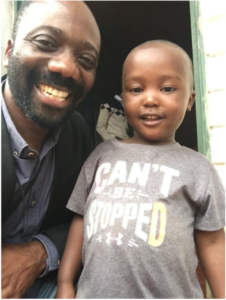
Germain was just two years old when his village in Oicha was attacked by rebels in 2017. As gunfire disrupted the otherwise peaceful community, he hid with his parents under their bed. Amidst the chaos and for fear that the attackers would enter their home, his mother placed Germain on her back and ran for the woods to hide.
As Germain’s mother ran across the street they saw the rebels and decided to hide behind a few banana trees. But they were found and Germain’s mother was shot. As she breathed her last breaths, she untied and released her son from her back. After calling out to his mother for a sign of life, he slowly walked away. Fortunately, Germain was reunited with his father after the attackers left the area.
Shortly after the attack, our team at Bethesda Counseling Center visited the village to offer support for family members of the victims. There, I met Germain and his father who told me what happened. For months, my team and I would sit and journey with them through their grief and trauma.
Today, Germain is five and a healthy child who loves school. Filled with tears that carried both grief and joy, the father explained to me on my last visit, “You saved our lives.”
Their story is just one of many that I have heard either personally or through one of our counselors. It is a story that reveals the deep trauma and grief many in the Beni territory have experienced over the years. Stories of senseless violence, pain, and suffering.
Even before we launched Bethesda, I met many students at Université Chrétienne Bilingue du Congo (UCBC), who had experienced terrible atrocities and heartache. Some of them lost family members in the war. Some had fought in army or militia groups thinking they were protecting their communities. It was apparent to me that many struggled with their studies because of the weight of trauma they carried as well as personal and family issues.
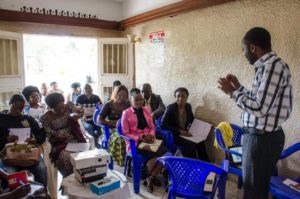 Over the years, as I hear these stories of grief, I am often reminded of my own. When I was 16 years old in Oicha, I lost my father. As the youngest of 15, I was overwhelmed with love and care from my very large family, yet I struggled to figure out how to grieve. “Why was it so hard for me? Why did my siblings seem to be farther along in the process?,” I would ask myself. For years I felt stuck and this was only exacerbated as I witnessed my country spiral into civil war and I lost one of my sisters. My grief was in front of me like an insurmountable mountain.
Over the years, as I hear these stories of grief, I am often reminded of my own. When I was 16 years old in Oicha, I lost my father. As the youngest of 15, I was overwhelmed with love and care from my very large family, yet I struggled to figure out how to grieve. “Why was it so hard for me? Why did my siblings seem to be farther along in the process?,” I would ask myself. For years I felt stuck and this was only exacerbated as I witnessed my country spiral into civil war and I lost one of my sisters. My grief was in front of me like an insurmountable mountain.
My own journey towards healing began when I attended Wheaton College to get my Masters in Counseling in order to equip myself with the knowledge and skills to help members of my community back in Congo receive psychosocial support. The program incorporated space for our own personal growth and after four months of intense counseling, I began to feel the weight of grief and pain lift.
The idea of “professional counseling” is a foreign concept to many communities in Congo and sometimes perceived negatively. Most people go either to their religious leaders for care or to another leader in the community considered wise and experienced. Though this is not necessarily a “bad” thing in and of itself, these leaders may not be equipped to respond to the psychological and social toll trauma has on individuals and communities.
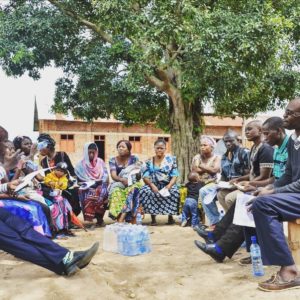 The overwhelming needs of the communities in Congo are the consequence of years of terror, atrocities, and neglect. Beginning with the brutality of colonization, much of Congo’s history is characterized by oppression and violence. In the Beni territory, the situation has grown worse over the past five years, with more frequent killings and massacres. Hundreds of families have been displaced and struggle to make a living. Despair has only intensified as the region faces the second-largest Ebola outbreak in history. To date, more than 2,250 people have died from the virus, leaving hundreds of families in traumatic grief. For surviving family members, they can’t grieve in a way that aligns with their cultures and customs. A member from one of these families reported to our team:
The overwhelming needs of the communities in Congo are the consequence of years of terror, atrocities, and neglect. Beginning with the brutality of colonization, much of Congo’s history is characterized by oppression and violence. In the Beni territory, the situation has grown worse over the past five years, with more frequent killings and massacres. Hundreds of families have been displaced and struggle to make a living. Despair has only intensified as the region faces the second-largest Ebola outbreak in history. To date, more than 2,250 people have died from the virus, leaving hundreds of families in traumatic grief. For surviving family members, they can’t grieve in a way that aligns with their cultures and customs. A member from one of these families reported to our team:
I felt guilty having not buried my loved one. You know, in our culture, we believe that a dead person gets angry against us [the family] when we don’t participate in his/her burial.”
Fortunately, it seems like the Ebola outbreak is coming to an end. But it will leave a tremendous amount of grief and trauma in its wake that will require special attention for months – even years – to come.
But this is where I believe God has placed Bethesda. We want to live into our name as a place of healing and restore lives through counseling services that meet the psychological, emotional, and social needs of individuals and communities. Since we launched the center in 2016, we have offered a diversity of services – from group counseling, to healing music and play therapy, to counseling for those sexually abused. In response to the Ebola outbreak, we provide counseling and a program to address fear and stigmatization. We also help individuals and families process their grief and learn healthy coping mechanisms and self-care.
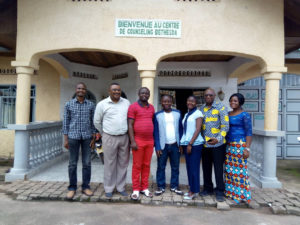 I am incredibly proud of our small team and the way they work together to serve clients and beneficiaries. They serve with compassion and concern, always willing to listen to the pain of others. As the need has grown, so have we and we are now working to train 100-300 caregivers in the Beni region over the next five years. We aim to equip people with a deeper understanding of grief, trauma, and the practices needed to manage it all. We hope to create a network of community and psychological first responders – individuals who can accompany those traumatized as they go through the process of healing and restoration.
I am incredibly proud of our small team and the way they work together to serve clients and beneficiaries. They serve with compassion and concern, always willing to listen to the pain of others. As the need has grown, so have we and we are now working to train 100-300 caregivers in the Beni region over the next five years. We aim to equip people with a deeper understanding of grief, trauma, and the practices needed to manage it all. We hope to create a network of community and psychological first responders – individuals who can accompany those traumatized as they go through the process of healing and restoration.
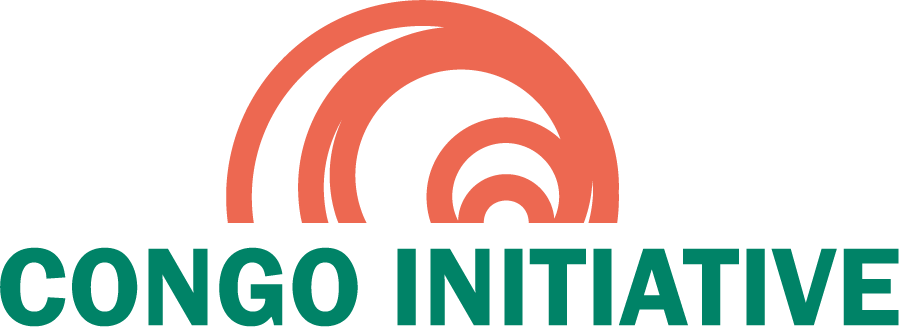
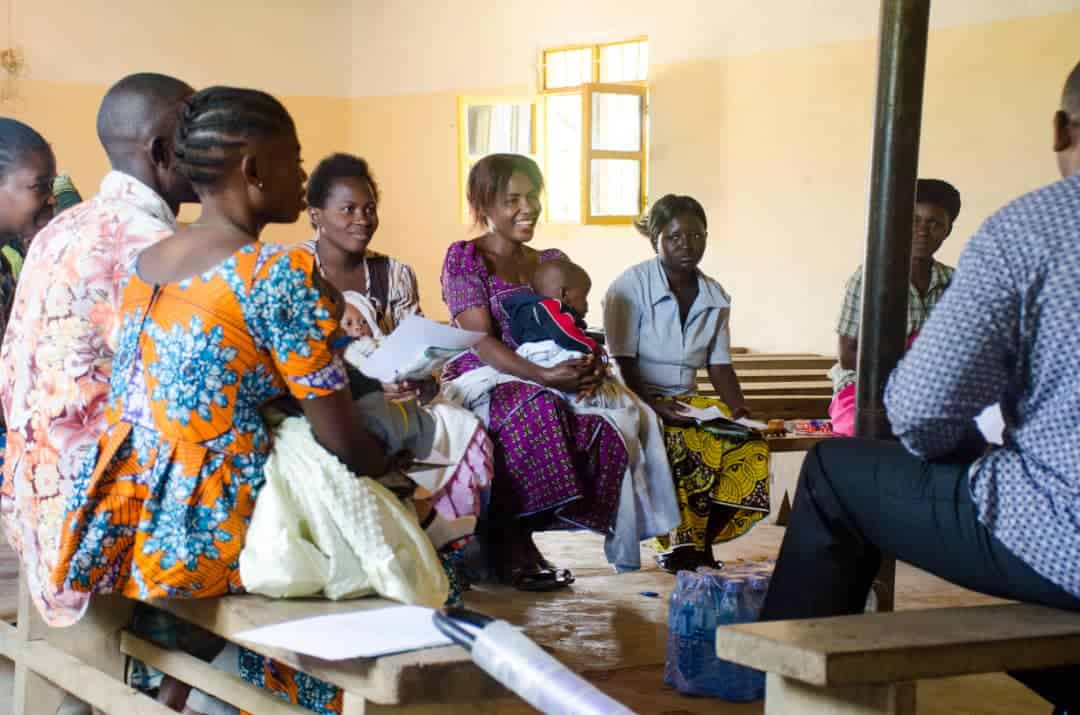
Leave a Reply